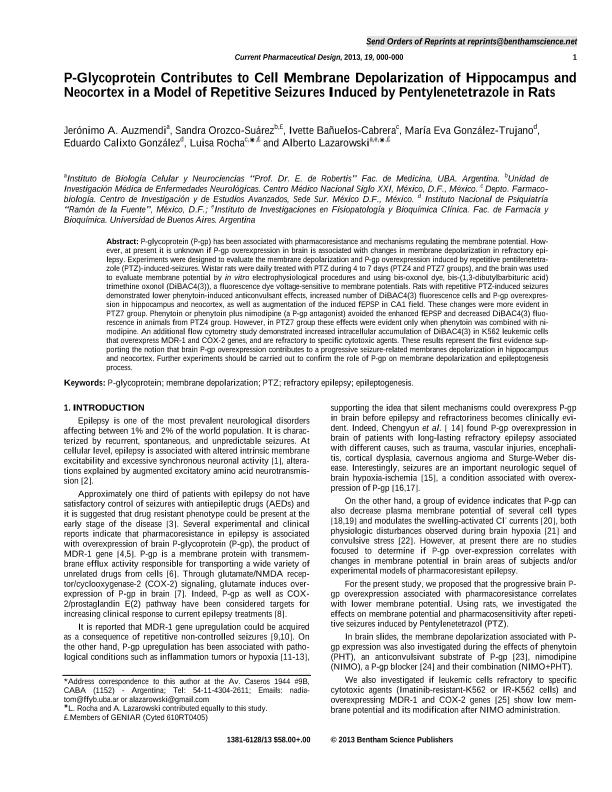Artículo
P-Glycoprotein contributes to cell membrane depolarization of hippocampus and neocortex in a model of repetitive seizures induced by pentylenetetrazole in rats
Auzmendi, Jerónimo Andrés ; Orozco Suárez, Sandra; Bañuelos Cabrera, Ivette; González Trujano, Maria Eva; Calixto Gonzàlez, Eduardo; Rocha, Luis; Lazarowski, Alberto
; Orozco Suárez, Sandra; Bañuelos Cabrera, Ivette; González Trujano, Maria Eva; Calixto Gonzàlez, Eduardo; Rocha, Luis; Lazarowski, Alberto
 ; Orozco Suárez, Sandra; Bañuelos Cabrera, Ivette; González Trujano, Maria Eva; Calixto Gonzàlez, Eduardo; Rocha, Luis; Lazarowski, Alberto
; Orozco Suárez, Sandra; Bañuelos Cabrera, Ivette; González Trujano, Maria Eva; Calixto Gonzàlez, Eduardo; Rocha, Luis; Lazarowski, Alberto
Fecha de publicación:
03/2013
Editorial:
Bentham Science Publishers
Revista:
Current Pharmaceutical Design.
ISSN:
1381-6128
Idioma:
Inglés
Tipo de recurso:
Artículo publicado
Clasificación temática:
Resumen
P-glycoprotein (P-gp) has been associated with pharmacoresistance and mechanisms regulating the membrane potential. However, at present it is unknown if P-gp overexpression in brain is associated with changes in membrane depolarization in refractory epilepsy. Experiments were designed to evaluate the membrane depolarization and P-gp overexpression induced by repetitive pentilenetetrazole (PTZ)-induced-seizures. Wistar rats were daily treated with PTZ during 4 to 7 days (PTZ4 and PTZ7 groups), and the brain was used to evaluate membrane potential by in vitro electrophysiological procedures and using bis-oxonol dye, [bis-(1,3-dibutylbarbituric acid) trimethine oxonol (DiBAC4(3)], a fluorescence dye voltage-sensitive to membrane potentials. Rats with repetitive PTZ-induced seizures demonstrated lower phenytoin-induced anticonvulsant effects, increased number of DiBAC4(3) fluorescence cells and P-gp overexpression in hippocampus and neocortex, as well as augmentation of the induced fEPSP in CA1 field. These changes were more evident in PTZ7 group. Phenytoin or phenytoin plus nimodipine (a P-gp antagonist) avoided the enhanced fEPSP and decreased DiBAC4(3) fluorescence in animals from PTZ4 group. However, in PTZ7 group these effects were evident only when phenytoin was combined with nimodipine. An additional flow cytometry study demonstrated increased intracellular accumulation of DiBAC4(3) in K562 leukemic cells that overexpress MDR-1 and COX-2 genes, and are refractory to specific cytotoxic agents. These results represent the first evidence supporting the notion that brain P-gp overexpression contributes to a progressive seizure-related membranes depolarization in hippocampus and neocortex. Further experiments should be carried out to confirm the role of P-gp on membrane depolarization and epileptogenesis process.
Archivos asociados
Licencia
Identificadores
Colecciones
Articulos(INQUIMAE)
Articulos de INST.D/QUIM FIS D/L MATERIALES MEDIOAMB Y ENERGIA
Articulos de INST.D/QUIM FIS D/L MATERIALES MEDIOAMB Y ENERGIA
Citación
Auzmendi, Jerónimo Andrés; Orozco Suárez, Sandra; Bañuelos Cabrera, Ivette; González Trujano, Maria Eva; Calixto Gonzàlez, Eduardo; et al.; P-Glycoprotein contributes to cell membrane depolarization of hippocampus and neocortex in a model of repetitive seizures induced by pentylenetetrazole in rats; Bentham Science Publishers; Current Pharmaceutical Design.; 19; 38; 3-2013; 6732-6738
Compartir
Altmétricas



